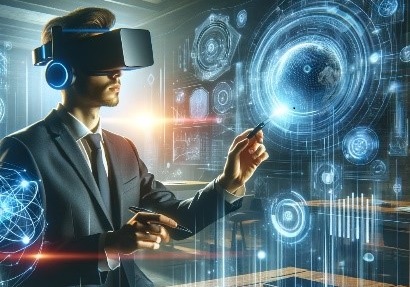The industrial revolution in the digital age

Leading companies such as Siemens, Deutsche Bahn and igus are entering the era of the industrial metaverse - a digital revolution that has the potential to radically change sales, engineering and service.
The vision of parallel digital universes, known as the metaverse, is increasingly becoming a real possibility for industrial companies. The concept, coined by Neal Stephenson, is no longer just a science fiction scenario, but is taking shape in initiatives such as the iguversum from igus, which is building a bridge to a new way of selling and engineering. This advanced technology, supported by artificial intelligence and big data, could reach a market value of several trillion dollars by 2030.
The Industrial Metaverse enables companies to transfer physical technologies into 3D models and bring international teams together in virtual spaces. This allows them to plan and simulate plants and machines more efficiently than ever before. Siemens’ Digital Native Factory in Nanjing is a pioneer with its digital twin approach, which has significantly improved the accuracy of factory planning and productivity. Similarly, igus uses the iguversum to guide customers and sales staff through virtual worlds in which products and solutions can be experienced interactively.
The future of the industrial metaverse promises collaboration without geographical boundaries, where global teams carry out entire projects as avatars in the digital world, eliminating the need for physical meetings and traditional means of communication. This not only leads to a more vivid visualisation of projects, but also to faster and more efficient project implementation.
In addition to optimising product development processes, the metaverse also enables innovative after-sales service concepts. Technical training could take place in an immersive environment that allows lifelike learning and interaction with digital twins of real objects.
Augmented reality, familiar from games such as Pokémon Go, represents the next stage of development. This technology allows engineers to project 3D models from the metaverse into their real environment and thus assess the compatibility of planned machines with their surroundings.
However, the challenge remains to increase awareness and understanding of the industrial metaverse. A survey by TeamViewer shows that many people are not yet informed about the technology. Further education is therefore needed to realise the full potential of this revolutionary digital transformation.